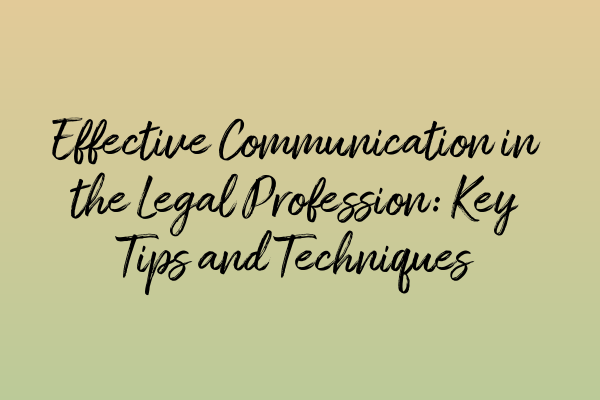Effective Communication in the Legal Profession: Key Tips and Techniques
Welcome to another informative blog post from Become Solicitor SRA! In today’s article, we will explore the crucial topic of effective communication in the legal profession. As a solicitor, mastering communication skills is paramount to your success. Whether you are representing clients, negotiating with opposing parties, or collaborating with colleagues, the ability to effectively communicate can make or break a case. So let’s dive right in and explore some key tips and techniques that will enhance your communication skills in the legal field.
1. Active Listening
Active listening is a fundamental skill for any solicitor. It involves not only hearing what the speaker is saying, but also fully understanding their perspective, concerns, and objectives. By actively listening, you can gather crucial information, demonstrate empathy, and establish a strong rapport with your clients. This will enable you to provide more tailored and effective legal advice. To become a better active listener, try to maintain eye contact, ask relevant questions, and provide feedback to show that you genuinely understand and value your client’s input.
2. Clear and Concise Language
Legal jargon can be overwhelming and confusing for clients who are not familiar with the law. As a solicitor, it is essential to communicate complex legal concepts and advice in plain and simple language that can be easily understood. Avoid using excessive legal terminologies and opt for clear and concise explanations instead. This will not only enhance your clients’ understanding but also build trust and confidence in your expertise. Remember, effective communication is all about conveying information in a way that is accessible and comprehensible to your audience.
3. Non-Verbal Communication
Communication goes beyond words; it also involves non-verbal cues such as body language, facial expressions, and gestures. As a solicitor, you should be mindful of your non-verbal communication as it can greatly impact how your message is perceived. Maintain good posture, maintain appropriate eye contact, and use expressive yet professional body language. By being aware of your non-verbal cues, you can convey confidence, professionalism, and credibility.
4. Tailor Your Communication Style
Every client is unique, and their communication preferences may vary. One size does not fit all when it comes to communication styles. Some clients may prefer to be highly involved in the legal process and want detailed explanations, while others may prefer a more concise approach. It is essential to adapt your communication style to suit each client’s needs and preferences. By doing so, you can establish trust and effectively address their concerns.
5. Use Technology to Your Advantage
In today’s digital era, technology has become an integral part of the legal profession. Embrace the use of technology to enhance your communication. Whether it is through email, video conferencing, or document sharing platforms, technology provides convenient and efficient ways to communicate with your clients and colleagues. Embrace these tools to stay connected, streamline processes, and improve overall communication.
Now that we have explored some key tips and techniques for effective communication in the legal profession, we hope you can implement these strategies to enhance your communication skills. Remember, effective communication not only strengthens your professional relationships but also improves your ability to advocate for your clients.
If you found this article helpful, you may also be interested in our related articles:
- SQE Prep: Tips and Tricks to Excel in Criminal Law
- Cross-Examination Techniques: Mastering the Art of Questioning
- Private Prosecutions: Exploring Non-Governmental Prosecutions in Criminal Cases
- Ethical Challenges in Criminal Defence: Navigating Dilemmas
- Assault and Battery Laws: Understanding the Legal Parameters
Thank you for reading! Stay tuned for more insightful articles from Become Solicitor SRA!


Leave a Reply